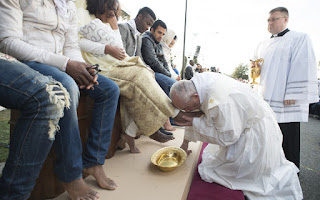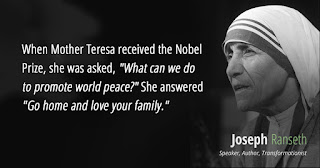Let no one deceive himself. If anyone among you considers himself wise in this age, let him become a fool, so as to become wise. For the wisdom of this world is foolishness in the eyes of God. 1 COR 3:18-19
When Simon Peter saw this, he fell at the knees of Jesus and said, “Depart from me, Lord, for I am a sinful man.” For astonishment at the catch of fish they had made seized him and all those with him, and likewise James and John, the sons of Zebedee, who were partners of Simon. Jesus said to Simon, “Do not be afraid; from now on you will be catching men.” When they brought their boats to the shore, they left everything and followed him. Luke 5:8-11
Piety
Every heart needs to be set free,
from possessions that hold it so tight
'Cause freedom's not found in the things that we own,
It's the power to do what is right
Jesus, our only possession,
giving becomes our delight
We can't imagine the freedom we find
from the things we leave behind
We show a love for the world in our lives by worshipping goods we possess
Jesus has laid all our treasures aside "love God above all the rest"
'Cause when we say 'no' to the things of the world
we open our hearts to the love of the Lord and
it's hard to imagine the freedom we find from the things we leave behind.
from possessions that hold it so tight
'Cause freedom's not found in the things that we own,
It's the power to do what is right
Jesus, our only possession,
giving becomes our delight
We can't imagine the freedom we find
from the things we leave behind
We show a love for the world in our lives by worshipping goods we possess
Jesus has laid all our treasures aside "love God above all the rest"
'Cause when we say 'no' to the things of the world
we open our hearts to the love of the Lord and
it's hard to imagine the freedom we find from the things we leave behind.
Study
Today’s passage from Luke has parallels in different parts of the other Gospels. The Story of the Calling of the First Disciples is related in Mark 1 and Matthew 4. However, the story of the First Miraculous Catch is similar to the post-Resurrection episode in John 21.
The placement of the Miraculous Catch has an important meaning as both an initial calling and as a recommitment story. One key difference is that in Luke, Jesus is in the boat, using it as a pulpit to preach to the crowds before instructing Simon Peter to “put out” for the catch. In John’s telling, the fishermen are on their own and Jesus is on the beach.
Jesus has no doubt that the fishermen will be successful despite the futile efforts overnight. After he had finished speaking, he said to Simon, “Put out into deep water and lower your nets for a catch.” (Luke 5:4).
Although there is no reason the fishermen should be afraid of the Miraculous Catch, the very next words Jesus tells them are key: “Do not be afraid; from now on you will be catching men.” (Luke 5:10B) “Do not be afraid” is a message we will hear over and over and over again from the lips of Jesus as he gets us ready to learn his true nature and our true mission.
Michael Card (writing in Luke: The Gospel of Astonishment) reminds us that the real Miraculous Catch belongs to Jesus. “…[Jesus] is the fisherman here. He casts his net and – behold! – catches four men who will become key leaders among the Twelve.” To succeed, nothing can come in the way of the mission. Let on one deceive themselves. They leave everything to follow Jesus.
Action
Only a few times in my life have I really “gone fishin.” I have found that – like Simon Peter learned – it really pays to have a Captain who knows his craft – not just the boat but the trade of fishing. A few years ago while visiting Prince Edward Island, Canada, I went on an afternoon fishing boat – not to catch fish or men but to photograph the fishermen.
Our Captain took us to our first spot where the other passengers hauled in plentiful amounts of small mackerel. When we picked up anchor and put out to the second spot, we then used the mackerel as bait and caught dozens of cod. Everyone went home with fresh fish to grill that night – including the photographer.
What are you being asked to fish for? Who is your captain, your guide? How can you approach the task not with fear but with confidence that gives you a strong chance of success?
Going fishing is not a comfort zone to retreat to like Louis Armstrong and Bing Crosby. Instead, it is the hard work we must do. Oh, yeah.








